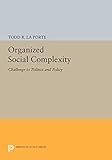Organized Social Complexity : Challenge to Politics and Policy / Todd R. La Porte.
Material type: TextSeries: Princeton Legacy Library ; 1504Publisher: Princeton, NJ : Princeton University Press, [2015]Copyright date: ©1975Description: 1 online resource (390 p.)Content type:
TextSeries: Princeton Legacy Library ; 1504Publisher: Princeton, NJ : Princeton University Press, [2015]Copyright date: ©1975Description: 1 online resource (390 p.)Content type: - 9780691617701
- 9781400869961
- 301.1832
- HM131 -- O73 1975eb
- online - DeGruyter
- Issued also in print.
| Item type | Current library | Call number | URL | Status | Notes | Barcode | |
|---|---|---|---|---|---|---|---|
 eBook
eBook
|
Biblioteca "Angelicum" Pont. Univ. S.Tommaso d'Aquino Nuvola online | online - DeGruyter (Browse shelf(Opens below)) | Online access | Not for loan (Accesso limitato) | Accesso per gli utenti autorizzati / Access for authorized users | (dgr)9781400869961 |
Frontmatter -- Contents -- List of Figures and Tables -- Preface -- PART ONE. Explication of the Concept of Organized Complexity: Studies in Its Effects -- Chapter I. Organized Social Complexity: Explication of a Concept -- Chapter II. Complexity and the Limits of Human Understanding -- Chapter III. Organizational Complexity in the New Industrial State: The Role of Technology -- PART TWO. Approaches in Policy Analysis and Design -- Chapter IV. Complexity, Planning, and Public Order -- Chapter V. The Use of Systems Constructs in Simplifying Organized Social Complexity -- PART THREE. Methodology: Some Implications for Research -- Chapter VI. Analysis of Complex Systems: An Experiment and Its Implications For Policy Making -- Chapter VII. On Studying the Future Behavior of Complex Systems -- PART FOUR. Prospects in the Study of Social Complexity -- Chapter IX. Complexity as a Theoretical Problem: Wider Perspectives in Political Theory -- Chapter X. Complexity and Uncertainty: Challenge to Action -- Bibliography -- Index -- Backmatter
restricted access online access with authorization star
http://purl.org/coar/access_right/c_16ec
One striking feature of modern political and social development has been the construction of social systems encompassing more and more groups. The increase in social complexity, the authors of this volume contend, has reached a point where accepted concepts fail to describe social and political phenomena adequately. The studies in this book reevaluate traditional assumptions. Part One defines organized social complexity and discusses the effects of technological change. Part Two assesses national planning and systems analysis, approaches supposed to provide direct control over social matters. Part Three describes methodological aspects and research applications, and Part Four provides retrospective and prospective views of theories on social complexity.Originally published in 1975.The Princeton Legacy Library uses the latest print-on-demand technology to again make available previously out-of-print books from the distinguished backlist of Princeton University Press. These editions preserve the original texts of these important books while presenting them in durable paperback and hardcover editions. The goal of the Princeton Legacy Library is to vastly increase access to the rich scholarly heritage found in the thousands of books published by Princeton University Press since its founding in 1905.
Issued also in print.
Mode of access: Internet via World Wide Web.
In English.
Description based on online resource; title from PDF title page (publisher's Web site, viewed 30. Aug 2021)


